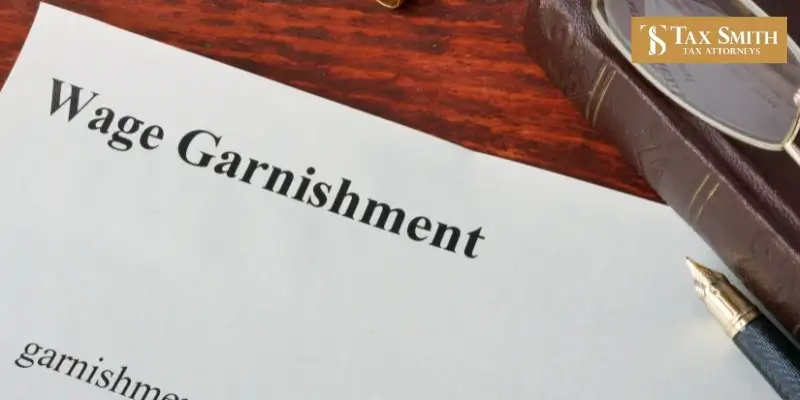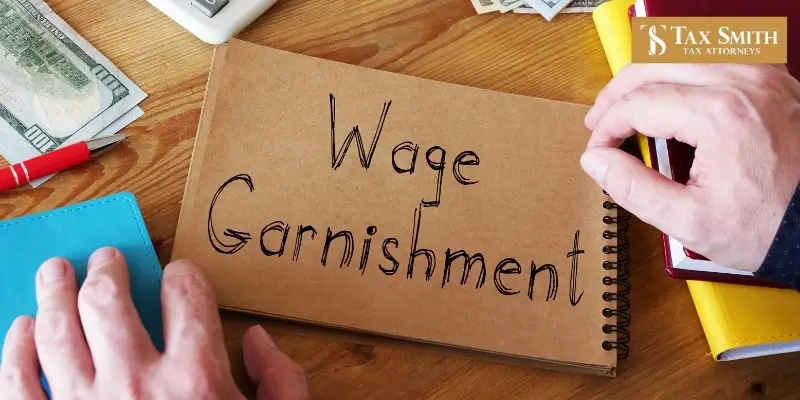1548 The Greens Way – Ste. 4 Jacksonville Beach FL 32250
Miami Wage Garnishment Lawyer
Miami Wage Garnishment Attorney
Wage garnishment is a step taken by creditors when you have significant debt that you have not made any attempt to pay or negotiate. Most creditors have to get court approval to take a portion of your wages, but the Internal Revenue Service (IRS) doesn’t. This garnishment can substantially impact your daily life. A Miami wage garnishment lawyer is an essential ally during this time and could help you avoid or minimize the financial impact of garnishment.

Ignoring tax debt is the wrong option. In addition to wage garnishment, the IRS may take other actions to collect what it is owed. The sooner you address the tax debt, the more you can protect your financial situation. Working with a Miami tax debt settlement lawyer can help you explore relief options and negotiate a resolution that prevents further financial damage.
Work With TaxSmith, LLC to Avoid IRS Collection Actions
Wage garnishment can be very financially draining, particularly when you rely on each paycheck. Working with a tax attorney can help save you money by finding the most effective way to address your tax debt and potentially minimizing the amount you owe. Otherwise, you may pay the IRS much more than is needed.
At TaxSmith, LLC, we have collected decades of combined experience in tax law. We can help you address tax issues with state and federal agencies.
The IRS Taxpayer Assistance Center in Miami is located at 51 SW Avenue. Our firm can help you discuss with the IRS through this office and help you prepare for meetings and negotiations.
Wage Garnishment in Miami
The IRS collected more than $325 billion from Florida taxpayers, including individuals and businesses, in 2024. Many people fail to pay taxes, and the IRS works to collect all the taxes it is owed. One of the methods the agency uses is wage garnishment. The agency requires your employer to remove a portion of your wages and send it directly to the IRS to cover your debt. This could happen for months or years, depending on your debt.
Throughout the U.S., the IRS made nearly 314,000 requests of third parties to comply with levies of assets, including wages. If you don’t take action to address wage garnishment, you could face this loss in your income until your debt is fully paid off. The IRS may also take other collection actions to collect the debt more quickly.
What Wages Are Impacted by Wage Garnishment?
Wage garnishment affects many different forms of income, including:
- Hourly wages
- Yearly salary wages
- Commissions
- Bonuses
- Profit sharing
- Incentive payments
- Periodic pension payments
- Retirement program payments
- Termination and severance pay
- Employment-based disability plan payments
- Workers’ compensation wage replacement benefits
- Governmental benefits
- Accounts receivable for self-employed workers
There are some limits for how much of these wages most creditors can take, and these limits may differ depending on the type of income. Some creditors or types of debt have different limits, such as state or federal tax agencies, or debt that is caused by unpaid child support.
How Can You Resolve Wage Garnishment?
The IRS is willing to help taxpayers. In 2024, the IRS closed more than 232,000 cases for requests for taxpayer assistance. If you cannot financially pay your tax debt without putting yourself in extreme financial hardship, the IRS is willing to negotiate. Some options for resolving wage garnishment include:
- Negotiating with the agency to lower the amount being garnished from your wages
- Negotiating another resolution for your tax debt, including entering into an installment agreement, making an offer in compromise, or applying for penalty abatement
- Applying for the head of household exemption for Florida state taxes, which can partially or entirely prevent your wages from being garnished
- Filing for specific types of bankruptcy that prevent wage garnishment
The fastest and most effective way to stop wage garnishment is to pay off your entire debt. If you can’t afford this financially, an attorney can talk you through these other options to potentially resolve your tax debt or end garnishment.

FAQs About Miami, FL Wage Garnishment Law
How Can You Stop Wage Garnishment in Florida?
The quickest way to stop wage garnishment in Florida is to pay the debt you owe in full. Once the payment is processed, the garnishment should be removed. You may also be able to negotiate the garnishment. When the garnishment is placed by the IRS, you could negotiate other ways to resolve the debt, such as settling through an offer in compromise or creating a payment plan that gives you more time to pay back the tax debt.
Can I Quit My Job to Avoid Wage Garnishment?
Quitting your job can stop wage garnishment, and neither you nor your creditor will get income this way. Instead, the creditor can take other collection actions. This may include levying your bank account, meaning they seize the assets you have. A creditor can also place a lien on your property, preventing you from selling it or refinancing it. A lien could also result in property seizure to cover your debt. It is better to address garnishment instead of avoiding it.
Can I Be Garnished Without Being Served?
Most creditors are required to get court approval to garnish your wages, and it would be illegal for them to garnish your wages without this approval. However, some debts do not require court approval. This includes unpaid taxes to a state or federal agency and unpaid child support. You will still receive notice from a state or federal tax agency that you owe taxes prior to your wages being garnished.
How Do You Negotiate a Garnishment?
You can negotiate a garnishment by directly discussing it with the creditor. This is easier with the help of an attorney. Whether negotiation is possible will depend on the significance of your debt owed, the creditor you owe the debt to, and your current financial circumstances. You are more likely to be able to negotiate if the garnishment is putting you in financial hardship. An attorney can look at your specific situation to determine if you are able to negotiate.
Take Action Quickly to Prevent or Reduce Wage Garnishment
If you’ve received notice of nonpayment from the IRS or the Florida Department of Revenue, it is important to address that quickly. If you are facing collection actions, it is crucial to act even more quickly. There are ways to limit or prevent wage garnishment from affecting your life. Get in contact with TaxSmith, LLC today to schedule a consultation and see how we can help you.
Locations We Serve
- Alabama
- Arizona
- California
- Colorado
- Connecticut
- Delaware
- District of Columbia
- Florida – HQ
- Georgia
- Idaho
- Illinois
- Indiana
REQUEST A CONSULTATION
Please fill out the Contact Request Form and a Tax Attorney/Paralegal will call you
to discuss legal representation or to schedule your free initial consultation





